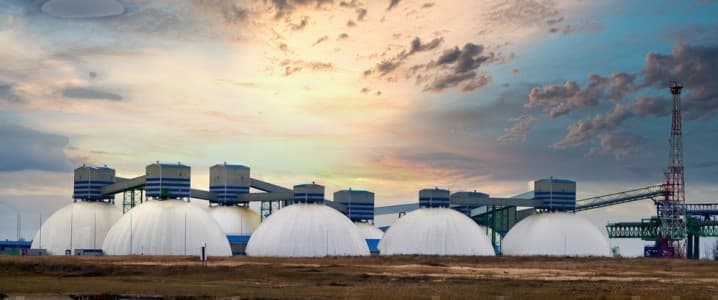Asia has been the driver of global demand for liquefied natural gas for years now, with its fast-growing economies guzzling energy at elevated rates. This year, however, has seen this change. Asian demand for LNG is weakening—but Europe’s is on a substantial rise, more than offsetting Asia’s weakness, despite plans to reduce consumption of all hydrocarbons.
LNG imports to Asia last month stood at 22.84 million tons, Kpler data, cited by Reuters’ Clyde Russell, showed. This was a slight increase from September but palpably lower than October 2024, when imports hit 24.39 million tons. Over the first ten months of the year, Asia’s imports of liquefied gas were down by over 14 million tons on the year to 225.8 million tons. Russell suggests China was one driver of this trend, booking year-on-year LNG import declines every month since November 2024.
Yet while Asian energy importers curbed their purchases of liquefied gas, European buyers stepped up their orders. The Kpler data shows that over the first ten months of the year, Europe imported 101.38 million tons of the fuel. This was 16.75 million tons more than what Europe imported a year earlier—even as the EU leadership boasted about permanently reducing the bloc’s consumption of natural gas, not just from Russia but in general.
It was this increase in European LNG purchases that likely affected demand for the superchilled fuel in Asia. Despite growing at a faster clip than Europe overall, Asian economies are more price-sensitive in energy imports. A surge in demand for LNG from Europe regularly prices out poorer Asian importers, although an argument could be made that Europe is finding it increasingly hard to pay its own energy import bills as it stretches itself thin to fund an energy transition away from oil and gas, and an accelerated buildout of military capabilities that requires cheap energy to be successful.
Europe, in other words, has emerged as a hotspot for LNG demand, drawing the attention of producers. However, this attention is not homogeneous. U.S. Energy Secretary Chris Wright, for instance, has repeatedly called on Europe to stop importing Russian energy altogether and boost its purchases of U.S. LNG. Indeed, the European Commission’s president Ursula von der Leyen signed a trade deal with President Trump, committing to a massive increase in such purchases. Yet one of the largest LNG exporters in the world, Exxon, has warned it may have to stop doing business with the EU unless it axes new legislation that aims to force international companies to track their emissions and human rights record across their supply chains.
Exxon, moreover, is not the only one threatening to quit Europe if it goes ahead with the Corporate Sustainability Due Diligence Directive. Qatar, the world’s number-two in LNG exports, is also going to stop selling gas to Europe if it tries to force QatarEnergy to track and reduce its emissions, and monitor human rights protection, or risk getting fined 5% of its annual global revenues.
Meanwhile, as the EU buys ever more LNG—including from Russia—one energy-focused energy transition advocacy outlet warned the bloc should not saddle itself with long-term LNG purchase commitments, because demand for gas in Europe was about to shed a quarter over the next 25 years.
Related: China’s Crude Imports Jump as Other Commodity Purchases Falter
“European countries risk over-relying on one supplier if they commit to long-term US LNG contracts. The US supplied more than half (57%) of Europe’s LNG imports in H1 2025, as deliveries from the country reached a new high,” the Institute for Energy Economics and Financial Analysis reported earlier this month, noting that Germany and Greece had topped the single-supplier list, sourcing a respective 94% and 84% of their LNG from the United States over the first half of the year.
Yet the IEEFA believes this acceleration in LNG purchases this year is a temporary glitch while demand dynamics point to a weakening in the future. The reason: more wind and solar. This has been the go-to argument of the pro-transition lobby, even though evidence suggests the record buildout of wind and solar generation has done little to change the energy consumption makeup of the European energy system outside certain seasonal output peaks. Germany, for instance, was recently revealed to have booked the highest rate of power generation from natural gas power plants due to weak winds for most of the year.
While the IEEFA and other transition outlets predict gas demand destruction in Europe, they also predict a glut of LNG due to excess capacity. Yet cheaper LNG is likely to only push demand higher across more importing countries as the commodity becomes more affordable for everyone. With the weather unlikely to become more predictable in the future, chances are that reliance on natural gas will continue strong in both Europe and Asia, regardless of transition ambitions.
By Irina Slav for Oilprice.com
More Top Reads From Oilprice.com
Oilprice Intelligence brings you the signals before they become front-page news. This is the same expert analysis read by veteran traders and political advisors. Get it free, twice a week, and you’ll always know why the market is moving before everyone else.
You get the geopolitical intelligence, the hidden inventory data, and the market whispers that move billions – and we’ll send you $389 in premium energy intelligence, on us, just for subscribing. Join 400,000+ readers today. Get access immediately by clicking here.



Leave a Comment
Your email address will not be published. Required fields are marked *